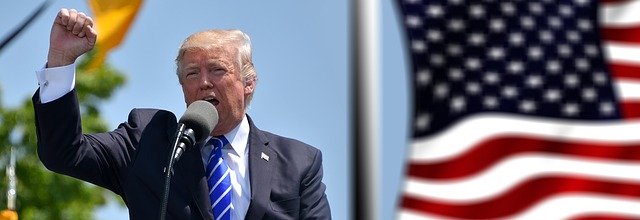The 2020 US Elections are getting closer. Consequently, polling is ramping up across the United States, of which media analysts and political pundits are ever fond of trotting out.
If polls were the be-all and end-all, then recent polling results point to presumptive Democrat nominee Joe Biden as the leader in the race to the White House. If political betting odds were any indication, however, then the opposite would be true. In political betting markets, Donald Trump has the distinct upper hand on the odds for the 2020 US Elections. In short, the odds stand in stark contrast to the polls.
Recent polls for President Donald Trump reveal an average approval rating of 45.7% – this includes 12 independent polling groups that encompass an approval rating high of 49 % (April 2020) and an approval rating low of 43% (January 2020).
One CNN poll between May 7 to 10 of this year showed Trump had a 45% approval rating. While Ipsos/Reuters’ poll between May 11 to 12 showed Trump had a 41% approval rating and Rasmussen Reports’ poll between May 11 to 13 revealed Trump had a 48% approval rating.
For what it’s worth, one could say that there is some symmetry between the aforementioned numbers. That is Trump’s rating at face value is under 50% across the board. In other words, it would be fair to say that Trump isn’t a candidate that a majority of Americans say they like or admire.
How polls are conducted from one group to another differs – from the timing and location of the polls to the sample size used and the questions put forward to the people involved in the poll, and so on. In essence, no two polls are identical and therefore should be taken with a grain of salt.
Gauging public support has been around since the 1930s. Indeed, the Gallup Poll was the first Presidential approval rating that was introduced by George Gallup in 1935. A poll mandated to put forward a scientific, nonpartisan assessment of American public opinion.
Conventional wisdom dictates that voters elect presidents they generally like or admire, but, in 2016 that notion was challenged when Trump stunned political pundits and experts who predicted a relatively straightforward and easy victory for Hillary Clinton based on polling.
Ahead of the 2016 general elections exit polls showed that a) less than 4 in 10 voters had a favorable opinion of Trump, b) just 1 in 3 thought Trump was trustworthy, and c) only 35% said that Trump had the right temperament to be president.
Trump defied the odds according to lasvegassportsbetting.com to emerge as the 45th President of the United States. He did so by taking advantage of the electoral college voting system that is unique to America.
Trump won the electoral college with 306 votes to Clinton’s 232 votes (270 votes are needed to win the presidency). However, Trump lost the popular vote by nearly 3 million votes (Clinton earned 65.9 million votes to Trump’s 63 million votes).
There have been five United States presidential elections since 1824 in which the winner lost the popular vote; two of which occurred in the last two decades, both included a Republican emerging victorious.
In 2000, George W. Bush won the electoral college vote but lost the popular vote to Al Gore. In 2016, Trump won the electoral college vote but lost the popular vote to Hillary Clinton.
All that the recent polls serve to do is to confirm in no uncertain terms that Trump’s popularity is just about the same as it was this time last year, despite the current coronavirus pandemic and all the heavy criticism the Trump administration has been on the receiving end over the last few months.
Moreover, an approval rating of under 50% quite simply is in keeping with Trump’s modest polling numbers over his term in office thus far and, at the same time, they’re not too far off of where they stood in 2016 ahead of the last presidential elections.
Whether they offer up any real value is up for debate. If 2016 represented a fundamental change in how presidents are elected – the discord between the electoral college vote and the popular vote – then 2020 could potentially do so again. Although should Trump win the electoral college vote and lose the popular vote for the second time in a row, it would mark a historical first. No U.S. President has served two terms in office after losing the popular vote twice in succession.







Trump has Re Floated the Titanic after 8 LOOONG Years of Incompetent Obama, who way over his head…Trumps lists of Accomplishments are Remarkable…China …America’s #1 Threat was Brought in Line via ‘Evening the Trade Playing Field’.. while past Presidents punted on the Issue and American jobs, businesses and jobs that went to China..are now coming back .All because of Trump ..among Many other things..In a very Short Time China would have Overtaken the U.S.A. Economically and Militarily …
He’s Not in Office for his Personality, he’s there to Make
America Great gain and he is…!!!